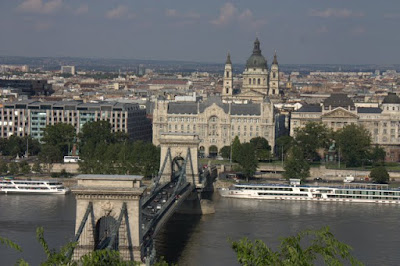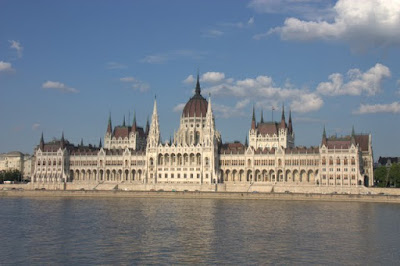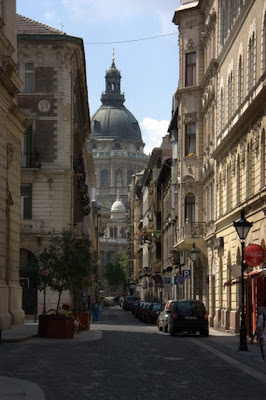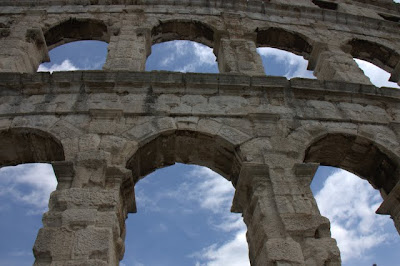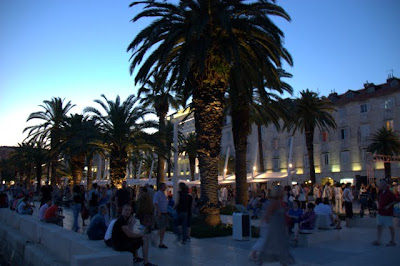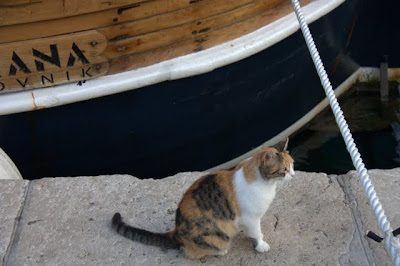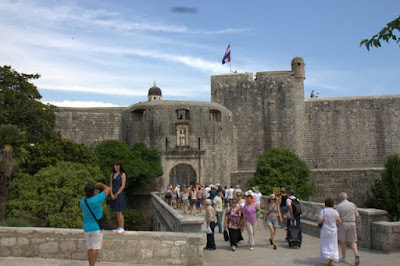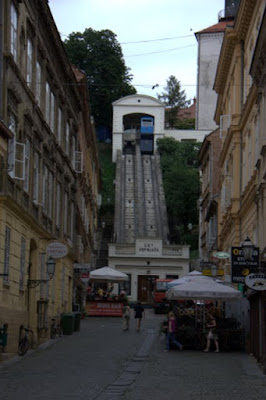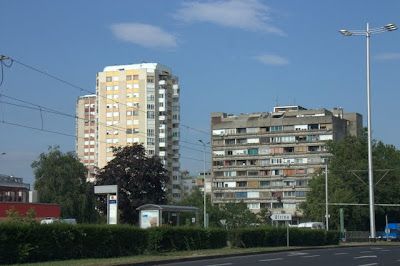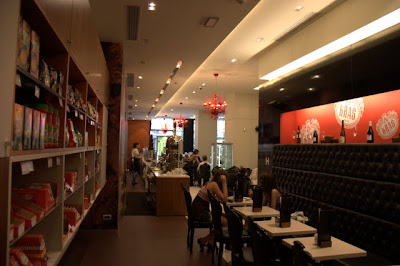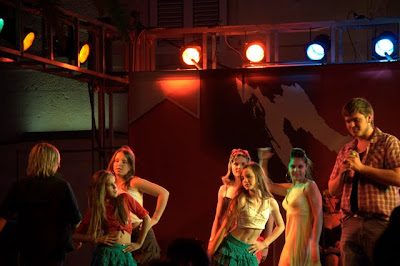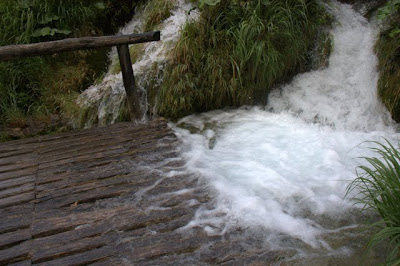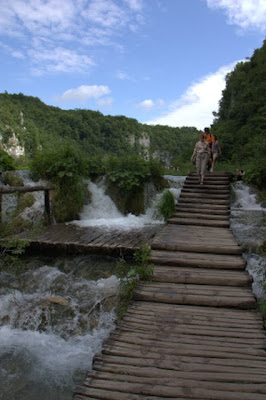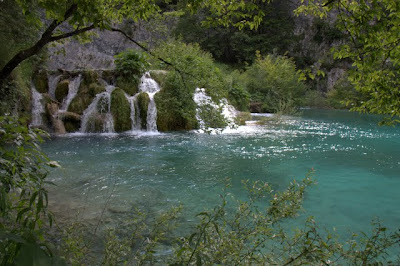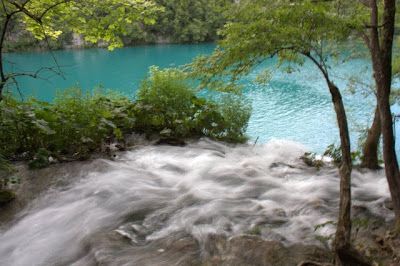Bath time
The quintessential experience in Budapest is to visit a bath. Thermal springs bubble underneath the city, and someone decided long ago it would be a good idea to tap into them. We visited one of Budapest’s more famous baths, the Szechenyi Baths. Szechenyi is located in Budapest’s City Park at the end of stately Andrassy Boulevard. We didn’t know what to expect, but the baths turned out to be like a giant warm swimming pool. Except people don’t really swim, they just sort of hang out in the water.
There are three baths inside: one warm, one hot, and one positively freezing.
Outside, there is one hot bath (like a giant hot tub), a lukewarm one designed for more movement, and a warm one.
The baths were filled with people, including many locals. Hungarians believe the thermal waters have healing powers. Sean mostly complained he was hot (considering it was a 90+ degree day), but did admit that his knee, which can be sore at times, did feel better.
In the warm pool, there were giant jets bubbling up. I waited around to float in the bubbles, and noticed the jets were occupied almost exclusively by women. And once they found one, they weren’t giving them up. I wondered what all of the fuss was about and then it dawned on me.
Of course. The bubbles were like the Rejuvenator.
Budapest Love
We loved Budapest almost immediately. The city felt very modern, stylish and graceful, yet one also felt a sense of history there.
It has something many other cities lack: trees. From the broad, magnificent Andrassy Boulevard, which has trees on either side and a tree-lined pedestrian strip in the middle, to the canopy of trees lining pedestrian only streets, Budapest looked green and leafy. The trees had strong, thick trunks, indicating their history, which complimented the stately architecture well.
I’m fond of cities that are so big that they swallow up the tourists. Because interesting things were all over the city, you could walk down the street and be amongst people just going about their day.
While formerly communist like the other places we have visited recently, the communism in Hungary was not as strict as other countries, giving rise to the term “goulash communism.” Apparently the Russians allowed Hungarians more freedom, such as the freedom to travel, making Hungary more Westernized than the rest of Central/Eastern Europe.
I did not realize until we went that Budapest is often compared to Paris. It is easy to see the comparison, although Budapest felt more relaxed than Paris. Between the casual grace of the city and our super sweet (but cheap!) apartment, we certainly felt relaxed there.

Our Two Croatian Lipa
There is a lot of advice on the Internet about the perfect Croatian itinerary. Croatia is a very long, narrow country, which makes it hard to get around. The train system is not extensive, and renting cars are expensive due to an Eastern European surcharge. The eleven hour bus rides we took twice were brutal (once from Pula to Split; once from Dubrovnik to Zagreb). The buses careened around every inch of Croatia’s long coastline. Scenic, yes, but not comfortable. So if you only have a short time in Croatia, it would be best to focus upon one region of the country.
Also, there is no getting around it: Croatia, especially in late June/early July, is full of tourists. For the most part, we didn’t find that spoiled our experience in Croatia, but it like most of Europe, it may be better visited in the spring or fall.
I’ve already told you about our good experiences at Plitvice National Park and on the islands. Here’s our two cents on the other places we have visited:
Rovinj
We only stayed one night in Rovinj, but we would have loved to have tacked on a second night. Rovinj has a church towering high above its old town, with views of the sea below. The old town is filled with narrow alleys with laundry lines criss-crossing above. Steep steps creep between old stone buildings. But most importantly, Rovinj seemed to be much more full of life than our previous coastal stop in Piran, Slovenia. Rovinj’s cafes and restaurants were full, and its steep lanes were dotted with artists’ shops. If your travels bring you to the Istria portion of Croatia, Rovinj is worth a stop.
Something about Pula never clicked with us. Its claim to fame is one of the largest Roman amphitheatres still standing. Seeing the amphitheatre was neat, but it took less than an hour. We personally think Pula didn’t stack up with the other places we visited in Croatia.
Split
Split is probably a necessity in any Croatian itinerary that includes a visit to the Dalmatian Islands from a logistics standpoint, but we found the city to be somewhat bland. At this point in our trip, it takes more than historic old stuff to impress us, and we didn’t find Split to have much of a personality. We did like its outdoor fruit market. Its promenade is fun (albeit with strange talent shows). It is full of hundreds of people, especially at night, even if they probably are all tourists.
Dubrovnik
Everything you read calls Dubrovnik the Gem of the Adriatic. This is probably an accurate description, so you are probably going to find what I’m going to say next to be completely crazy. Contrary to what all of the guidebooks say, I don’t think Dubrovnik is a must see and could be skipped. Now, I know no one is going to listen to me anyway, and that’s fine, because you should decide for yourself. I’m not saying don’t go there, I’m just saying if you don’t have the time, don’t beat yourself up trying to get there is it is fairly far south and there are other areas of Croatia that are just as worthy to visit. The old town is definitely scenic. It is enclosed by walls which you can walk upon. Steep stairs in narrow alleys lead down to a wide, bustling promenade. The city is very clean and well-preserved, especially considering it experienced bombing during Croatia’s war in the 1990s. What I didn’t like about Dubrovnik is that it is hard to find restaurants that do not have inflated prices and food better than mediocre.
Zagreb
We hardly saw any other tourists while we checked out Zagreb. After spending time in coastal Croatia in pretty much the high season, it was refreshing to be in a town where everyone is going about the business of living their daily lives. But if you want a city that is not touristy, you have to take the bad with the good. Zagreb will never win any awards for beauty. Out of all of the cities in the former communist countries we have toured, Zagreb had the most drab, utilitarian communist housing remaining. Other than the central old town area, the neighborhoods are full of huge, high rise buildings, all aging metal and steel. Graffiti is scrawled on the sides. At home, we’d wonder if we were in a ghetto. Here, it is just par for the course. And what can they do? They can’t tear it all down and rebuild solely for aesthetic reasons. But what we noticed the people who live there do make the best of it. Meticulously maintained flowers lined many yards. Hydrangeas are everywhere (making me wonder how my hydrangeas are doing at our old house). Window boxes perched on top of balconies, giving everyone bright spots to focus upon. We enjoyed our time in the city. We ate delicious Croatian chocolate at the Kras bonbonierre (reminiscent of Sarris, for you Pittsburgh folks); we rode Europe’s shortest funicular; we ate a delicious meal at a place using local produce on a lively pedestrian only street; we walked through the city’s green parks; and we visited a funky shop.

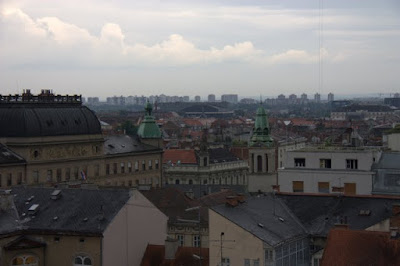
Kids these days…
The promenade in Split was the site of one of the most bizarre things we have seen on this trip: the Dan Drzavnosti Little Girl Talent Show. Now, I have no idea who this Dan Drzavnosti is, or what the name of this spectacle was, but his name was plastered all over the stage. We saw a crowd gathering around a stage, and a little bored, we went to check it out.
What we saw was who we assumed was this Dan person singing that uno, dos, tres song in a super flat baritone, while extremely young girls bounced around behind him as he sang, “You know I want you…” Dan didn’t look much older than the girls themselves.
The talent show, if that is what it was, was like a train wreck. Each song got worse and worse, yet we didn’t turn away. There was a young Gwen Stefani, full of sass, singing Hollerback Girl at the top of her lungs, even though she couldn’t have been more than eight.
There was a pint-size rapper, leading his posse with hair that only could have resulted from sticking their fingers in electrical sockets through a rendition of Black Eyed Peas’ song, Tonight’s the Night.
There was a Lady Gaga, singing Bad Romance with a large hair piece and all of the drama her 8? 9? 10? (at most) self could muster.
Then it really got out of control. The next girl got up on stage. She was – maybe – 13.
When she started singing about her lovely lady lumps and do you want the junk in her trunk, I couldn’t take anymore. Doesn’t ANYONE think this is really odd? These girls are so young! Judging by the people cheering by the stage, I guess not.
As I prepared this post, I decided to find out who this Dan Drzavnosti is once and for all. It turns out that Dan Drzavnosti is not a person, but the name of Croatia’s Statehood Day. So apparently this was for a state holiday celebration!
Water wonderland: Plitvice National Park
Our last stop in Croatia was a visit to Plitvice National Park. Apparently, some buses stop there, but from what I read on the internet, taking a bus could be complicated and may involve flagging one down on the side of the road in order to go home. This sounded like more trouble than it was worth, so when we saw an opportunity to rent a super sweet Fiat again for under $40, we jumped at the chance. (Of course, this doesn’t count tolls or gas. One problem with budget cars is they are usually gas guzzlers). Turns out this time, the Fiat was not even made in this decade. And when it was made, it had to be the cheapiest, crappiest car one could buy. Sean: This doesn’t even have power steering! Amy: What does it mean to have power steering?
Plitvice is one of Croatia’s national parks located about 2 hours from Zagreb. It has 16 different lakes, all connected by tons of waterfalls. If we thought the water was turquoise in Slovenia, that is just because we hadn’t seen Plitivice yet. Apparently the lime content in the lakes colors the water various shades of blues and greens. Plitvice is the type of place better explained in pictures than in words, so without further ado:
If you go, consider going to the park late in the day after the tours leave. It only took us about 2 1/2 hours to go through the course that was supposed to take 3 to 4 hours. We also spent about another hour in the park walking up above. The park closes at 7:00, so going around 3:00 or 4:00 will give you plenty of time without most of the crowds.
